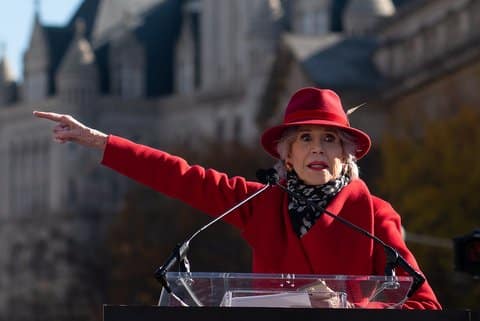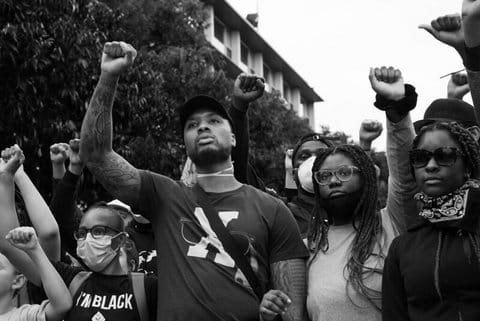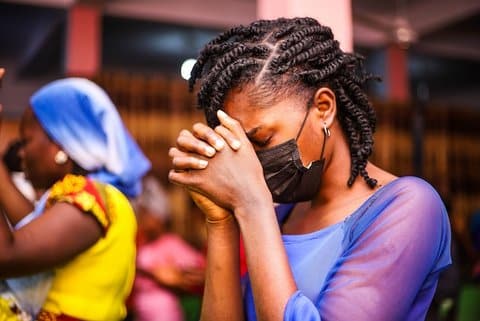
26 Apr Jane Fonda Discusses Her Lifetime of Acting & Activism

Jane Fonda speaks as Fire Drill Fridays returned to in-person demonstrations in Washington D.C. on Dec. 2, 2022. (“Fire Drill Fridays” by Miki Jourdan via Flickr / CC BY-NC-ND 2.0 license)
By Natasha Kaye
The name Jane Fonda may be one of the most recognizable of the many activists involved with the anti-war and civil rights movements of the 1960s and 1970s.
Fonda was once much maligned for her antiwar stance — derisively called “Hanoi Jane.” Now, the actress is celebrated for her activism.
With two Academy Awards, a fitness empire, and an extensive track record of political and social activism, Fonda established herself as a Hollywood legend and a changemaker. The California Endowment hosted a discussion with the 85-year-old actress April 11 to discuss her lengthy and still ongoing activism career.
It began during the Vietnam War when she toured the country leading anti-war protests. In the discussion, Fonda recalled that her father — Oscar-winning actor Henry Fonda — served in the military and she had believed that if the American flag was flying somewhere, “then we were on the side of the angels.”
But her perspective shifted drastically when she was introduced to the book “The Village of Ben Suc” by Jonathan Schell. It relayed the story of the destruction of a prosperous Vietnamese village by American forces.
“When you’re a believer and then you’re shown to have been tricked, you’re angrier than someone who didn’t really think about it much,” Fonda said. “I was so angry.”
She was so angry, in fact, that she dove headfirst into the anti-war movement, ultimately relocating back to the United States from Paris so she could join the anti-war resistance as a civilian at home.
As she became more prominent in the political resistance, her activism evolved to include not just the anti-war movement, but also environmental justice, civil rights and Native American resistance efforts.
She talked about on her first time being arrested in 1970 in Seattle. It was during the Fort Lawton protests when she joined several Indigenous tribes in occupying land the government was trying to give away. She recalled watching as police violently beat the indigenous leaders, women and children around her, all while leaving her — a white celebrity — unscathed.
“At first, I was ashamed,” said Fonda. “I felt like my privilege and class put a barrier up between me and them.”
Having doubts about her role as an activist, she confided in attorney and revolutionary Ken Cockrel that she wanted to quit acting as she felt it separated her too much from the people she was trying to reach. What he responded with forced her to reconsider.
“He said, ‘Fonda, you listen to me: The movement has all the organizers we need; it doesn’t have movie stars. So not only should you not quit acting, but you should pay attention to your career. Make movies that mean something. Use your platform.’ ”
After that, she began shifting towards producing her own films to uplift the voices of frontline activists who simply didn’t have her status.
She likened herself to a radio receiver at the top of the mountain that brings the voices from the depths of the valley and transmits them across the world for everyone to hear.
“That’s what we are, I think,” Fonda said. “We’re receivers.”
While Fonda is aware her privilege and star status allow her to have a broader platform than other activists, she is adamant that all organizers know their “movement manners” before embarking on the fight for a cause.
“You have to understand there have been people at it far longer than you, and you have to listen to them and the lessons they have to teach,” said Fonda.
>>>Read: ‘Our Ancestors Fought’: Bridging Activism’s Generation Gap
In 2019, she joined forces with executive directors from Greenpeace to form “Fire Drill Fridays,” an activist group dedicated to putting pressure on Washington D.C. to fight the climate crisis by protesting Big Oil directly at the steps of Capitol Hill every Friday for a month. Fire Drill Friday events have continued online.
Although the in-person demonstrations resulted in Fonda being arrested five times, she applauded the group’s efforts to help pass a state Senate bill that would provide more protections for people in California from harmful environmental pollutants. While the bill’s opposition has already made efforts to have it overturned, Fonda remains adamant that these are all steps in the right direction. Their pushback is a sign that activists’ efforts are working, she believes.
“Hope is a muscle, and you’ve got to use it, and when you use it through activism, it’s always there,” Fonda said.
In her closing remarks, she told people to keep fighting for what is right and not get discouraged because “the important battles aren’t won easily.”
“The fight for power is longer than any of our lives, so we shouldn’t expect to win these big battles quickly and then get discouraged and go home,” Fonda said. “No. We have to keep at it. It’s a relay race. You pass the baton, but you keep going.”
Additional reporting contributed by Danielle Parenteau-Decker






No Comments